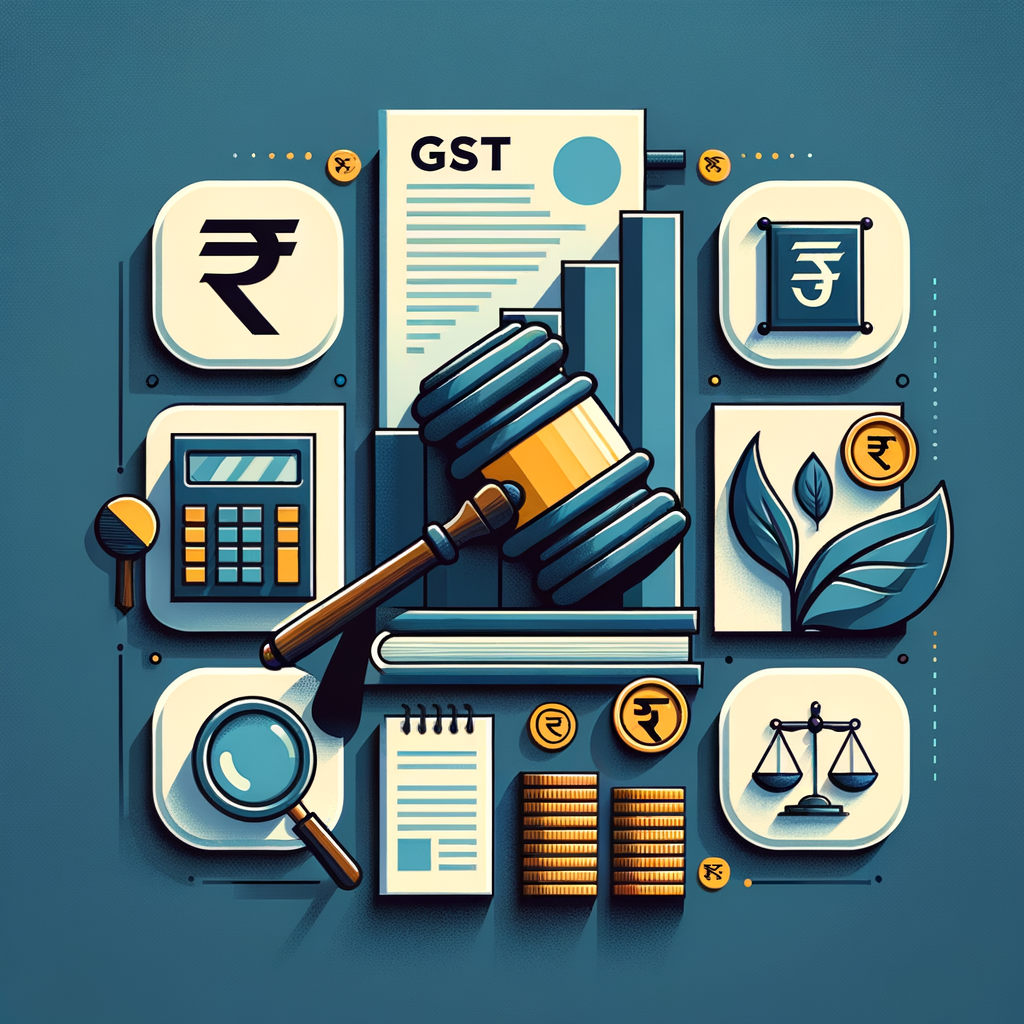Landmark GST Case Laws: An Overview for Business Owners
The Goods and Services Tax (GST) regime in India, while designed to simplify the indirect tax structure, can often feel like a complex maze of rules, notifications, and regulations. As a business owner, your focus is naturally on following these guidelines. However, the GST landscape is not static; it is constantly being shaped and clarified by decisions from our nation’s courts. This landmark case laws overview is designed to bridge the gap between complex legal jargon and practical business application. Judicial pronouncements, or case laws, play a critical role in interpreting ambiguous provisions of the GST Act, providing clarity where the letter of the law is silent or unclear. Understanding these judgments is not just an exercise for lawyers; it is an essential strategy for smart tax planning, ensuring robust compliance, and avoiding costly legal disputes. This article serves as a practical business owners guide to landmark case laws India, breaking down significant GST judgments and explaining their direct impact on your day-to-day operations.
The GST Framework and the Role of Case Law
Before diving into specific judgments, it is crucial to understand the foundational structure of GST and why court decisions hold such significant weight. This context helps in appreciating the profound impact that a single ruling can have on thousands of businesses across the country. The legal framework provides the rules, but case law provides the interpretation and practical application, making it a vital component of your compliance strategy.
A Quick Refresher on GST in India
The Goods and Services Tax is a comprehensive, multi-stage, destination-based tax levied on every value addition. The framework is dual in nature, with taxes levied concurrently by both the central and state governments. The core components you interact with are: CGST (Central GST) collected by the Central Government, SGST (State GST) collected by the State Government for intra-state transactions, and IGST (Integrated GST) collected by the Central Government for inter-state transactions. For Union Territories, UTGST is applicable in place of SGST. This entire structure is governed by recommendations from the GST Council, a constitutional body responsible for making decisions on rates, exemptions, and procedures. For any entrepreneur, understanding the nuances of GST is non-negotiable, making it one of the most important business laws for entrepreneurs India has introduced in recent decades. For official information and updates, the government’s GST Portal is the primary resource.
Why Court Judgments Matter for Your Business
In any legal system, laws are often written in a way that can be open to multiple interpretations. When disputes arise between taxpayers and tax authorities over these interpretations, the matter is taken to court. The principle of judicial precedent comes into play here. In simple terms, a ruling made by a higher court, such as a High Court or the Supreme Court, becomes a binding interpretation of that specific point of law. This ruling must be followed by lower courts and tax authorities in future cases with similar facts. These judgments provide much-needed clarity on contentious and frequently debated issues like the eligibility of Input Tax Credit (ITC), the correct classification (and therefore, tax rate) of goods and services, conditions for claiming refunds, and the proper execution of procedural requirements like issuing notices or conducting investigations. A comprehensive case law overview for Indian businesses like this one is therefore not just an academic exercise; it’s a tool for risk management and strategic financial planning.
A Landmark Case Laws Overview: Key Judgments & Their Impact
To understand the real-world implications of judicial interpretations, let’s examine some of the most talked-about cases. These landmark business law decisions India has witnessed have provided significant relief to taxpayers and set important boundaries for the powers of tax authorities. Each case discussed below follows a simple “Issue -> Judgment -> Impact” structure to highlight the key takeaway for you as a business owner.
The Issue of Input Tax Credit (ITC) on ‘Gifts’ – The ‘Safari Retreats’ Case
- The Issue: A very common dilemma for businesses, especially in the real estate and infrastructure sectors, revolves around the rules for Blocked Credits Under Section 17(5): What ITC Cannot Be Claimed?. Specifically, this section blocks Input Tax Credit on goods or services used for the construction of an immovable property, even if that property is intended for business use. The question before the court was: Can a company claim ITC on the construction costs of a commercial property, like a mall, which it intends to lease out to other businesses? The tax department’s view was a straightforward “no,” based on the explicit block in the law.
- The Judgment (Safari Retreats Pvt. Ltd. vs. Chief Commissioner of Central GST): The Orissa High Court delivered a landmark pro-taxpayer ruling. The court reasoned that the very purpose of constructing the mall was to let it out, which is a taxable supply of service (leasing). Since the final output (rent) was subject to GST, the input tax paid on construction materials and services should be available as a credit. The court essentially stated that the input and output services were intrinsically linked in the same chain of business, and therefore, blocking the credit would defeat the fundamental principle of GST, which is to avoid the cascading of taxes.
- Impact on Your Business: This judgment is a beacon of hope for businesses in the real estate, hospitality, and warehousing sectors. It strengthens the argument that ITC should be available as long as the immovable property is used to make a taxable outward supply. It allows businesses to argue for ITC on construction costs, potentially leading to significant cost savings. However, it is crucial to note that this is a High Court ruling and the tax department has contested this view in other forums and has appealed to the Supreme Court. Therefore, while this judgment provides a strong basis for your claim, seeking professional advice from a GST consultant is essential before acting on it.
Transporter’s Liability in Case of Tax Evasion – The ‘D.K.Enterprises’ Case
- The Issue: In the logistics and transport industry, the transporter is often just a facilitator, moving goods from a seller (consignor) to a buyer (consignee). A critical question arose: If the seller and buyer collude to evade tax, perhaps by using fake invoices while the goods in transit are genuine, can the transporter be held liable and penalized? Can the tax authorities penalize the transporter simply because the transaction between the other two parties was found to be fraudulent?
- The Judgment (D.K.Enterprises vs. The Assistant Commissioner of State Tax): The Calcutta High Court provided significant relief to the transport community. The court ruled that the transporter’s responsibility is limited to ensuring they are carrying valid documents for the goods in their possession, primarily the e-way bill and the corresponding tax invoice. If these documents are in order and the transporter is not a knowing party to the fraudulent intent of the consignor or consignee, they cannot be penalized for the tax evasion committed by others. The liability for tax and penalty, in such cases, rests with the parties who engaged in the fraud.
- Impact on Your Business: This is one of the major landmark judgments for business owners India in the transport and logistics sector. It clarifies the limited scope of a transporter’s liability and protects them from being penalized for the misdeeds of their clients. For your business, this ruling underscores the absolute importance of meticulous documentation. Ensure that for every consignment, you possess a valid and correctly generated e-way bill (refer to our Guide to GST E-Way Bill Generation for details) and a tax invoice that matches the goods being transported. This documentation is your primary shield against potential liability.
Provisional Attachment of Bank Accounts – The ‘Kanak Timber’ Case
- The Issue: Section 83 of the CGST Act gives tax authorities the power to provisionally attach a taxpayer’s property, including bank accounts, during an investigation. This is meant to protect the government’s revenue interests. However, the question was whether this power could be used arbitrarily. Can officials freeze a business’s bank accounts, and even the personal accounts of a proprietor, at the very beginning of an investigation without providing any concrete reason or evidence to justify such a drastic step?
- The Judgment (Kanak Timber vs. The State of Bihar): The Patna High Court delivered a powerful judgment safeguarding the rights of taxpayers. The court held that the provisional attachment of bank accounts is a “drastic” and “draconian” measure that cannot be invoked merely on suspicion. The tax officer must have credible, tangible material on record and must form a reasoned “opinion” that such an attachment is absolutely necessary to protect government revenue. A vague or unsubstantiated belief is not enough. The court emphasized that freezing bank accounts paralyzes a business, and this power should be used sparingly and only with proper justification.
- Impact on Your Business: This judgment is a critical protection against potential overreach by tax authorities. It ensures that your working capital and business operations cannot be disrupted by having your bank accounts frozen without due cause and a properly recorded justification. It empowers you to question the basis of such an action if it is ever initiated against your business. It reinforces the principle that the process of investigation must be fair and not punitive from the outset.
How to Apply These Landmark Business Law Decisions in Your Company
Understanding these judgments is the first step; the next is to integrate these learnings into your business processes. Being proactive can save you from future litigation and strengthen your compliance framework. Understanding How to Avoid Common Pitfalls Leading to GST Demand Notices is a key part of this strategy. This overview of business case laws India should prompt you to review and refine your internal GST handling procedures.
Conducting a GST Compliance Health Check
Use the insights from these landmark business law decisions India to conduct a quick health check of your company’s GST practices. Ask yourself and your team the following questions:
- ITC Claims: Are you maintaining detailed and robust documentation for all your Input Tax Credit claims? For capital goods and construction-related expenses, do you have a clear business case linking them to your taxable output services, similar to the principle in the Safari Retreats case?
- Vendor Management: How well do you know your suppliers and transporters? Are you conducting basic due diligence to verify their GST compliance history? The D.K.Enterprises case highlights the risk of dealing with non-compliant parties.
- Documentation: Are your transport documents, especially e-way bills and invoices, always accurate and in order? Ensure there are no discrepancies between the documents and the physical goods being transported.
The Importance of Staying Informed
The world of GST is dynamic. New clarifications, circulars, and court rulings are issued frequently. With recent landmark case laws India continually shaping the tax environment, staying ignorant is a significant business risk. You can stay updated through several channels:
- Subscribe to reputable financial newspapers and tax-focused online portals.
- Regularly check the official website of the Central Board of Indirect Taxes and Customs (CBIC) for new notifications.
- Follow the TaxRobo blog and subscribe to our newsletter, where we break down complex legal updates into simple, actionable insights for business owners.
When to Seek Professional Help
While this guide provides a helpful overview of business case laws India, applying the nuanced principles of a judgment to your specific business situation requires professional expertise. The facts of your case might differ slightly, which could lead to a completely different outcome. A qualified GST consultant or a CA can help you interpret the fine print of these judgments, assist in representing your business in case of any notice or dispute, and conduct a thorough audit to ensure your operations are fully compliant with the latest legal precedents. This proactive step is an investment in your company’s financial health and legal security.
Conclusion
The GST law, as written, provides the blueprint for compliance, but it is the judiciary that adds the color and context through its interpretations. As we’ve seen, case laws are not abstract legal concepts; they have tangible consequences for your Input Tax Credit, operational liabilities, and rights as a taxpayer. Staying informed about these developments is not a burden but a strategic advantage in building a resilient, compliant, and legally sound business. This landmark case laws overview is your starting point to becoming a more informed and empowered entrepreneur. By understanding the key lessons from judgments on ITC, transporter liability, and procedural fairness, you can proactively steer your business away from potential legal pitfalls and towards sustainable growth.
Navigating the complexities of GST judgments and their application can be challenging. Don’t leave your business exposed to risks due to misinterpretation or lack of information. Contact TaxRobo’s expert team today for a comprehensive GST compliance review and advisory services.
Frequently Asked Questions (FAQs)
- Q1: Is a High Court ruling on GST applicable to my business in another state?
A: A High Court’s judgment is technically binding only on the taxpayers and tax authorities within its own territorial jurisdiction. However, it holds significant “persuasive value” in other states. This means you can cite a favorable ruling from one High Court as a strong argument in a similar case before tax authorities or a tribunal in another state. The final law of the land, which is binding on everyone across India, is laid down by the Supreme Court. - Q2: Where can I read the full text of these GST judgments?
A: You can find official copies of judgments on the public websites of the Supreme Court of India and the respective High Courts. Many reputable legal and tax news portals also publish the full text of key rulings, often accompanied by expert analysis, which can help in understanding the decision’s nuances. - Q3: My business practice is different from what a new judgment suggests. What should I do?
A: If you read about a new ruling that seems to contradict your current business or accounting practice, it is crucial to act swiftly. The first and most important step is to consult with a tax professional immediately. They can analyze the specific details of the judgment, compare it with the facts of your business, and advise you on the necessary steps to align your processes. This proactive approach can help ensure future compliance and mitigate any risks associated with past practices.



